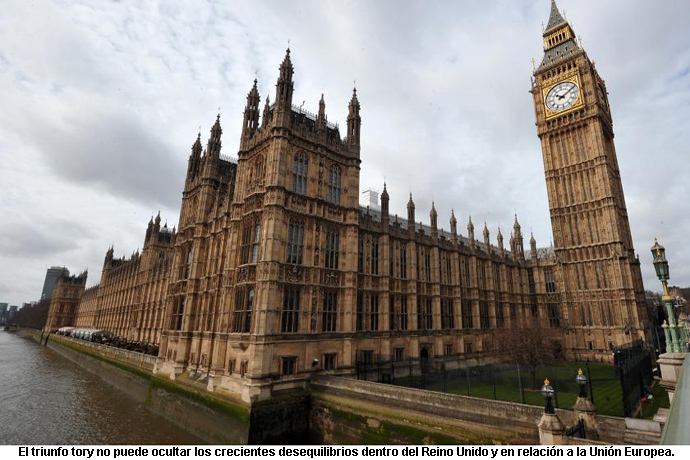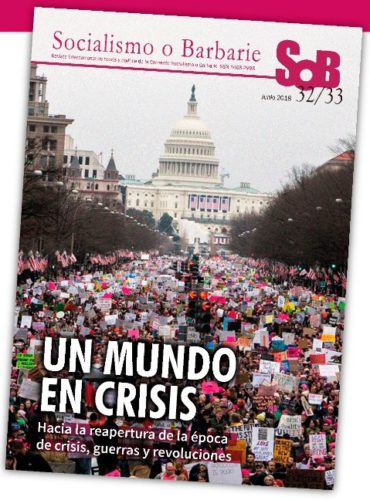
Victory of the Conservative Party with deepening of dangerous cracks in and out
«London. – Now, having more power than ever, the British Prime Minister, David Cameron, invited his European Union (EU) partners to choose between bad and worse.» On the same day of his electoral triumph he warned that he will honor his promise to convene a referendum that will define if Great Britain continues or not in the EU. He proposes to negotiate a special status for his country and then campaign for the Yes in the referendum. The leaders of the EU Cameron’s project, energized by an absolute majority won on Thursday, pushed them through a labyrinth in which all outputs may lead to a disintegration of the community scaffolding.» (Martín Rodríguez Yebra, «Cameron puts his European peers at a crossroads», PressReader, 10/05/2015)
« But overall the UK is becoming more fragmented electorally, in reality there were actually four different elections going on – Scotland, Wales, England and the North of Ireland. The Labour Party won in Wales, the Tories won in England, the SNP was triumphant in Scotland and the North of Ireland had its own unique dynamics («The implications of the general election results», (Socialist Resistance, May 10, 2015) )
Perhaps, over time, the official name of «United Kingdom” will turn out to be a black comedy joke. The general election, taken place last Thursday the 7° of May, reflected greatly disparate results (and also with different political scenarios) in each of those four regions, which in the past were different States.
It’s a dangerous fragmentation because it had its epicenter in Scotland, where the pro-independence Scottish National Party (defeated in the referendum of September last year) had a sweeping comeback in parliamentary elections. They won 56 of the 59 seats that were at stake. Along with the results came claims for a new referendum of independence… that they may win.
On the other hand, there’s another layer on this matter, one of a European scope type. The re-elected Tory Prime Minister did not lose a minute to take advantage of this unexpected victory to ratify his promise of a referendum to decide whether the United Kingdom will continue in the European Union or not. Previously, he proposes to negotiate with Brussels a «special status» for the United Kingdom. From there, he will decide if he calls to vote to stay in the EU or to divorce.
This blackmail is a crisis within the European Union. More and more sectors in EU countries, especially in the ones who are suffering Troika’s austerity plans, are questioning the Diktats of Berlin-Brussels. And why would the United Kingdom have the privilege of doing what they want, while other countries must abide by what is ordered to them?
At the same time, if Cameron finally convenes such referendum, it would stress even more the relations with Scotland, whose nationalists are fervently pro-European, in the attempt to get rid off London.
The keys of the tory triumph and the end of the two-party system
Although it occurs in the midst of these internal and external rifts – with political earthquake potential (as it would be the separation of the European Union or secession of Scotland)-, the election itself was a triumph of the stale and conservative right, the Tories, grouped since 1834 in the Conservative party, which for nearly two centuries were in the Government taking turns with the Liberal Party and then, until today, with the Labour Party.
The result turn out to be a political surprise, but to a certain extend. General polls and surveys predicted a very tight outcome or Labours win. But, against all odds, the Tories won 330 seats, giving them absolute majority of the 650 seats in the Parliament, and as a result they can form a Government without the need for alliances. Instead the Labour Party obtained only 232 seats. The Liberal Democrats (partners of Cameron in the previous Government), took the worst part, taking a punishment vote, that brought them down to just 8 seats. UKIP (United Kingdom Independence Party), of the xenophobic right wing, managed to get only 1 seat.
As noted, the other big winner was the Scottish National Party, which won almost all the seats in the region.
Where does this conservative victory come from? At first we can say that, although there have been struggles of some importance of the working class and also youth protests, the United Kingdom has failed to overcome serious defeats for, and from, a long time.
Concurrently, Labour Party has been suffering a long decay, a lengthy process that these elections have exposed. By all means the «Labour» – as the social-democracy in continental Europe– has not been for decades a «reformist» but social-liberal party. Therefore, during the Cameron years, neo-liberal course of labourism has been abject: its logical consequence is not fighting conservatives, with whom they share a political program, if we look close enough. This disgusted part of their traditional electorate, who stopped seeing them as an alternative to the Tories. In addition the Labour – unconditional defender of the integrity of the United Kingdom lost the votes of their stronghold, Scotland, at the hands of the nationalists who appear to be «to their Left».
Another non-negligible factor is that the British electoral system -together with its poor copy, the USA’s- is the most fraudulent and antidemocratic system in the world. There is no proportional representation, the territory is divided into hundreds of constituencies choosing a parliamentarian only by a simple majority.
Meaning, a party can achieve absolute majority in the Parliament with only a third or less of the vote cast… as it’s the case Cameron and the Tories nowadays. At the same time, a party (UKIP) can have 3.900.000 votes and achieve only a parliamentarian, and another list (such as the Ulster Sindicalist Party) have 114,000 and achieve two. [[1]]]
Meanwhile, it’s an actual fact that the UK’s traditional bipartisanship, that has stained more than two centuries of policy, is at its final stage. Proving to be an illegitimate representation system.
Finally, there was a political phenomenon that must be reviewed, the non-registration and, above all, abstention of the youth, with the exception of Scotland.
In the UK, as in the USA, people must register in order to vote. In addition, election takes place in a weekday. This tends to leave out working class, the poor and the discriminated, ethnic minorities and other “unpleasant sectors”… But now another serious event has occurred: the trend in youth to not register or not going to vote. According to a correspondent who covered the election in Manchester City Centre, «the polls show that only 16% of young people plan to vote». [[2]] even in student activism, there would be a strong feel of abstentionism. Months before the election, The Guardian warned that the usual enrolled number has been decreasing in universities areas, where a great part of the youth lives. [[3] ]]
However, this is uneven. Scotland, where the Independence cause has managed to move to broad popular sectors, not only was a different case scenario; in the district where a veteran Labour leader presented (who was going to be none other than Minister of the Foreign Office if they came to the Government), was beat by the young Mhairi Black, a 20 years political science student.
_____________________________
[1] .-In this unfavorable situation, the TUSC (Trade Unionist and Socialist Coalition), a coalition led by two Trotskyist organizations – the Socialist Party (SP) and the Socialist Workers Party (SWP)-, managed to present candidates in 128 districts, achieving about 37,000 votes.
[2] .-María Sahuquillo, «young people have one of the highest abstention rates in the EU. Their vote can make a difference», El País, 04/05/2015.
[3] .-«Number of voters on electoral register drops by 920,000 – Authorities have reported falls of 3-12%», The Guardian, 24 Feb, 2015.
By Claudio Testa


